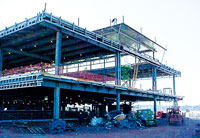With airline traffic still below 2001 levels and most major U.S. carriers drenched in red ink, the airport construction market remains much softer than it was a year ago. In the wake of the Sept. 11 attacks and economic slowdown, many airports pared construction plans. That lists most recent addition is Washington Dulles International in northern Virginia.
 |
|
Don Young (Photo by Office of Rep. Don Young) |
On April 17, the local airport authority finance committee voted to defer $1.5 billion of the $4.1-billion Dulles capital plan. That was only three weeks after the Miami-Dade Board of County Commissioners on March 26 trimmed the Miami International Airports phase one capital program to $4.8 billion, postponing $600 million that was in a plan approved earlier. Weak passenger volume is a big factor. In March, the Federal Aviation Administration forecast that volume will decline 12% in fiscal 2002, to 600.3 million enplanements, but rise 14% in 2003.
Still, the industry sees a significant amount of airport construction on the horizon. "I think one of the words thats really important is deferral, rather than cutback," says David Schlothauer, chairman of PB Aviation, a unit of Parsons Brinckerhoff, New York City.
Some firms are branching out a bit. Parsons Corp., Pasadena, recently won a 10-year, $1.25-billion, FAA contract to support airspace navigation systems. "Weve shifted from airports to aviation," says Loren Smith, aviation division manager.
Other additional design and construction work will stem from new federal airport security requirements, particularly for baggage-screening equipment. The U.S. Dept. of Transportations Transportation Security Administration has procurement under way for an airport security planning and management contract and for the screening machines themselves. One type of machine is heavy and has prompted concerns about floors weight-bearing ability, says PBs Schlothauer.
For Dulles, the Metropolitan Washington Airports Authority finance panel approved some new items, including $76.7 million to expand the terminals basement baggage-handling area for the new screening equipment, and $33.1 million for a basement in existing Concourse B, also for screening machines.
 |
|
ADDITIONS Dulles will expand baggage area. (Photo courtesy of the Metropolitan Washington Airports Authority) |
The committee continued projects that will add capacity, including a fourth runway, plus an addition to Concourse B. But it indefinitely postponed a new midfield concourse and underground rail link to that facility from the terminal.
Officials wanted "to take into account the impact of Sept. 11, which clearly has affected the number of passengers using both of our airports," says Tara Hamilton, airports authority spokesperson. For the first two months of 2002, Dulles traffic was down 8%, to 2.3 million. Reagan Nationals decrease was sharper.
Miami, where traffic dipped 5.8% last year, is deferring a major renovation of the central terminal and road work.
At San Francisco International, where the number of flights is hovering at about 17% less than pre-Sept. 11 levels, officials have delayed a $260-million renovation of the old international terminal. A new hotel also is on hold.
Many projects at other large airports were delayed, but there are opportunities at medium-sized airfields, says Parsons Smith, "Southwest [Airlines] hubs have fared the best," he says. Parsons recently won the front-end planning contract for a $600-million terminal expansion in Columbus, Ohio. "Columbus is preparing for the future. They will have the plans ready when the traffic resumes," says Smith.
Raleigh-Durham put its construction program on hold after Sept. 11, "but as we saw traffic would continue to hum along, we put projects back on track," says airport spokeswoman Mindy Hamlin. Raleigh-Durham expects to complete purchase of an American Airlines terminal in May, and will renovate it for multiple-carrier use and add gates. Construction will begin on the three to five-year project next spring. Eventually, Raleigh-Durham plans to redevelop a second terminal and quadruple the number of gates.
The downturn actually helped a large project at Bostons Logan International Airport. "We used the slowdown in air travel to expedite Delta Air Lines $400-million redevelopment project at Terminal A," says Barbara E. Platt, Logan spokesperson. "We helped relocate all five airlines now in the terminal earlier than planned so that demolition and the new, two-part construction could finish by 2005. Our move saved about nine months because the terminal would have been cleared gradually."
But Platt also notes that American Airlines $280-million redevelopment at Terminal B has been delayed.



Post a comment to this article
Report Abusive Comment